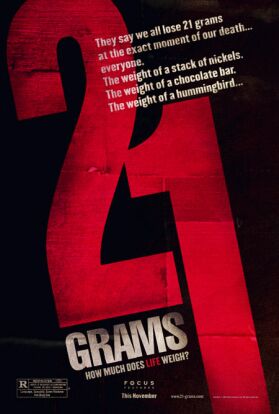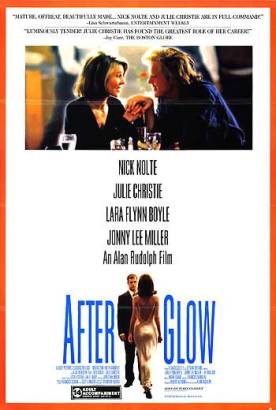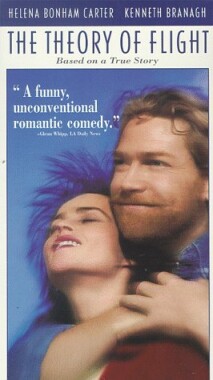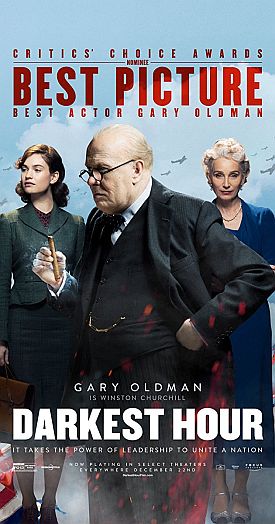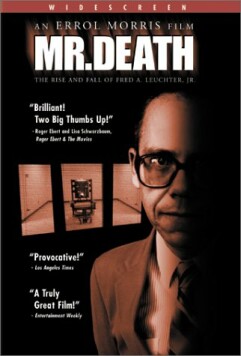21 Grams
In their new movie, 21 Grams, the remarkably talented Mexican team of Alejandro González IZárritu (director) and Guillermo Arriaga (writer) employ exactly the same device that they used in their remarkable Amores Perros of 2001 — that is, three sets of characters whose lives are all transformed in different ways and in a fractured time-scheme by the same accident. But whether because the set-up has worn a bit thin in the repetition or for some other reason, 21 Grams whose language is English and which is set in some anonymous city of the American West, is not so good as the earlier film.
Still, there is still a lot to like about it, at least until the ending where its attempt to manufacture a bit of profundity to go out on — 21 grams is supposedly the weight we lose at the moment of death and therefore may be thought to be the weight of, and so stand for the reality of, a human soul — only produces a let-down. The best thing is the story of Jack Jordan (Benicio Del Toro), a hard-luck ex-con who, in trying desperately to go straight, has found Jesus but doesn’t quite know what to do with Him. He drives the fatal truck, which he says was given to him by Jesus and which he has decorated with religious iconography and slogans, that kills the husband and two little girls of Cristina (Naomi Watts) and so sets the events of the movie in motion.
But we don’t see enough of him Jack or his long-suffering wife, Marianne (Melissa Leo) or his kids. At the dinner table one night, their small daughter cries that her brother, Freddy (Marc Musso), has hit her. Jack, always seeking to put into practice his new faith tells her to “turn the other cheek” and insists to his son that he hit her again. When he does, and she bursts into tears, Marianne takes her from the room, calling behind her: “Great parenting, Jack!” — whereupon Jack turns to Freddy in a rage: “No hitting in this house!” he says, hitting him. This combination of heart-tugging pathos and broad comedy is typical of the film at its best, and Jack and family get most of it. Most remarkable of all is when the daughter comes home from school and asks Freddy, before either of them has been told of the accident, if what the kids say at school is true, that their daddy has killed another daddy and his two little girls.
“Yes, he killed them,” says Freddy without hesitation.
By trying to do too much, however, the film short-changes its most interesting character, whose struggles with his conscience and his religious faith are more compelling viewing than either Cristina’s descent into grief, alcohol and drugs or her rescue from same by Paul (Sean Penn), a mathematician who is himself rescued, for a time, from certain death by the heart-transplant he has received from her dead husband. We have seen this guy before, except that in Bonnie Hunt’s Return to Me (2000) it was David Duchovny’s wife who died, bequeathing her heart and, with it, her husband to Minnie Driver. The comparison accentuates the hint, and more than a hint, of soap opera in Paul’s troubled relationship with Mary (Charlotte Gainsbourg), who seems to want his baby more than she wants him.
Insofar as we are able to keep the Days of our Lives side of the movie at arm’s length, it is because of the disjointed chronology which is, unusually I think, not just a bit of showing off but helps to imbue the film with a sense of fate or destiny — of all the past and future being present in any single moment. Another purpose of telling the story out of order comes in the confusion of the climactic scene, in which it appears that one of the characters shoots another. The confusion of the mLlée, however, is enhanced by being wrenched out of its narrative context, so that we go all through the movie thinking that one of the characters is going to shoot another when this is not what happens at all. This creates an interesting artistic situation, this illusion, this sleight of hand. In the end we have to go back and revise our opinion of everybody.
Yet we can’t help thinking that fate ought to be simpler and more terrible than this. There are too many fates for us to keep in our heads at once and the film is too coy about most of them, leaving us to guess what will happen. In the tangle of lives and destinies, the themes of God and guilt, so promisingly introduced, get lost until they return, too late, in Sean Penn’s concluding voiceover meditation on the weight of the soul in a hospital ICU, his own fate (if not his soul) still up in the air.
Discover more from James Bowman
Subscribe to get the latest posts to your email.

